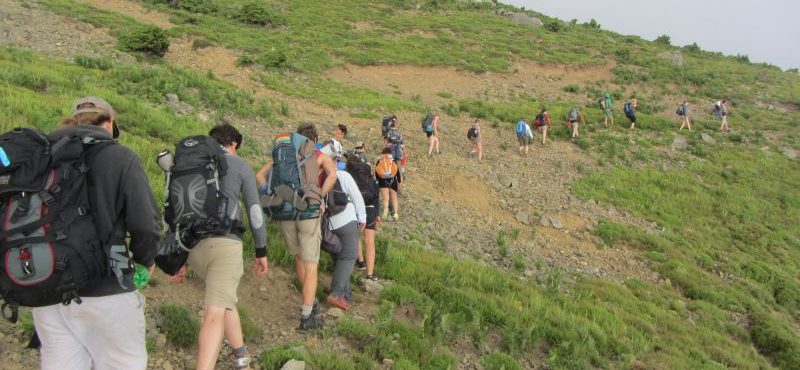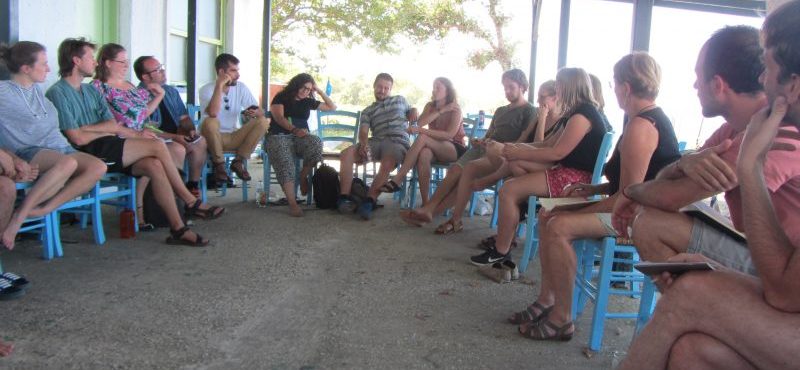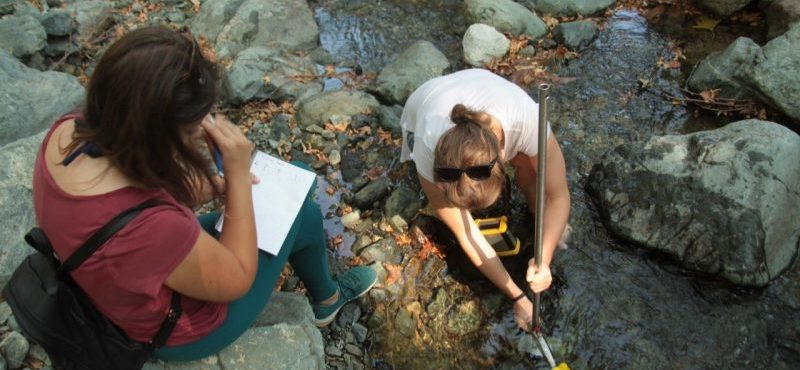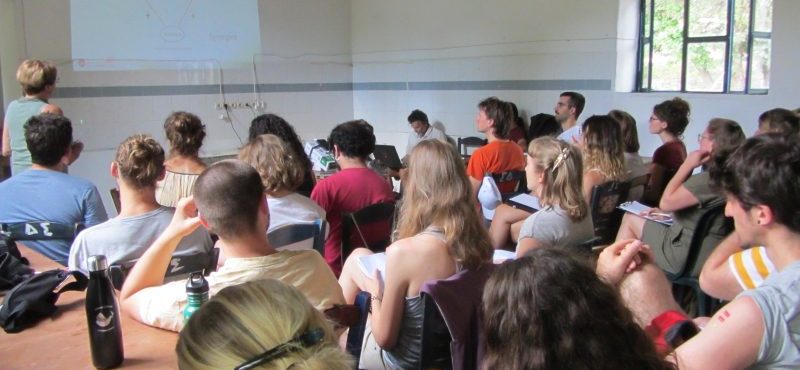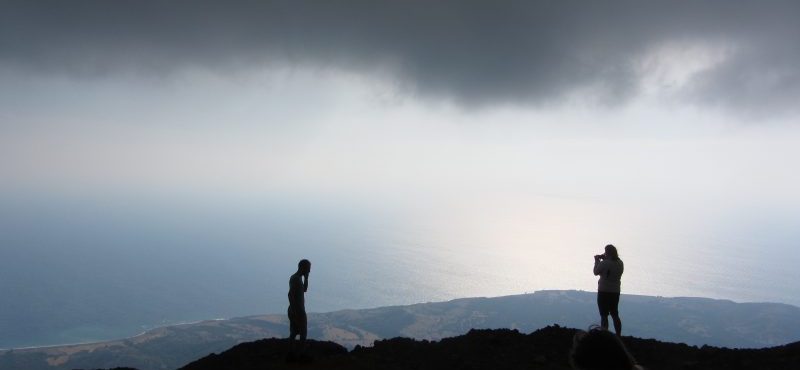In June 2019, is designed as a twelve-day excursion to the island of Samothraki in Greece, organized by the Institute of Social Ecology (Vienna), in collaboration with the Hellenic Centre for Marine Research (Athens).
Theoretical input was provided by several members of the research consortium presenting different aspects of current and future research undertaken on the island. Confirmed speakers include: Prof. Marina Fischer-Kowalski (Vienna Institute of Social Ecology, Alpen Adria University), Dr. Nikolaos Skoulikidis (Research Director, Institute of Marine Biological Resources and Inland Waters, Hellenic Centre for Marine Research, Greece), Dr. Simron Singh (Associate Professor, Faculty of Environment, University of Waterloo, Canada), Dr. Marjan Jongen (Forest Research Center, Instituto Superior de Agronomia and Department of Mechanical Engineering, Instituto Superior Técnico).
For the most part, students were splited in small groups and conduct fieldwork in an array of social and natural science methods frequently used in socioecological, ecological and aquatic research. Four modules were performed in parallel, each consisting of an information block, participating field research, data analysis and reporting. Each method was practically demonstrated by a tutor guiding the small student groups throughout the field work.
Modules:
2. Tourism metabolism (tutors: Marina Fischer-Kowalski, Angelos Varvarousis)
The precise focus of the module was up to the students participating, and also depended to a certain extent on the local support we got for conducting interviews, finding places and translating information. One issue was how to improve the synergy between local tourism and local agriculture / food production. Do local restaurants and supermarkets make use of local products? Do local producers use the opportunities or tourism (i.e. produce products that fill their demand, market their production?) How is this organized? What kind or measures would be required to improve this systemic interlinkage? To pursue this issue, we developed an interview schedule for restaurants and other food places, and make interviews (restaurant owners often speak also English or German). We also went for participant observation, legal and economic questions…
2. Waste (tutor: Simron J. Singh)
In the 2016 summer school, we undertook a qualitative assessment of waste flows on Samothraki, and estimated some out-flows (see reading above). Subsequently, a study by Dominik Noll et al. (under review by RCR) focused on Construction and Demolition Waste (CDW) on Samothraki. This year’s summer school focused on taking the waste module a step further, in terms of quantifying some waste streams, for example, plastic, cans, glass, and electronic waste. Participants were required to conduct onsite sampling, review available reports from the municipalities, and conduct interviews with different sectors. Based on this data, we came up with a better understanding on the economics of waste on Samothraki, and what might be opportunities to consider wastes as resources, and transition to a circular economy.
3. Water Metabolism – Water Management (tutors: Nikolaos Skoulikidis, Anastasia Lampou)
Samothraki is an island with significant water resources considering its area (Skoulikidis et al. 2014). However, as a result of unsustainable water management, some settlements and crops suffer from water scarcity during the summer period and a number of streams face artificial desiccation with adverse ecological consequences. Also, the island is vulnerable to floods since flood forecasting and respective abatement measures are missing. Currently, water management is carried out in old-fashioned, ad hoc and individualistic ways that are often inadequate to satisfy the needs, especially during extreme events, like floods and draughts. In the frame of SamoMAB project, a study on water metabolism and water management has been assigned to the Hellenic Center for Marine Research (Athens) by the University of Natural Resources and Life Sciences (Vienna). The study attempts to fill existing gaps on the issues of water availability, water demand and water use on Samothraki Island and propose a preliminary water resources management plan.
In the context of this module, the participants had the chance to joined some steps of this ongoing study. Specifically, they participated in the registration and mapping of water abstraction points and review available reports from the municipality. These data will further assist the development of the water metabolism and water management study.
4. The future of agriculture (tutors: Dominik Noll, Marjan Jongen)
The agricultural system on the island of Samothraki is currently in a multiple crisis which affects all 3 dimensions of the sustainability triangle. The natural ecosystems of the island are threatened by overgrazing and erosion due to the large numbers of sheep and goats. Livestock farmers are caught in an economic deadlock situation caused by low prices for their products, bad established offset markets, declining subsidies and increasing expenditures, especially for animal feed. Socially the future of agriculture is entirely at stake as the younger generation is not interested in continuing a business that has such a high workload with so little revenue. Farmers generally don’t see a future for farming on the island. The module builds up on many years of research conducted on the farming system of the island (Master’s Thesis Fuchs and previous summer schools and SBP project). In the last two years 23 interviews were conducted with local livestock farmers regarding the biophysical and monetary economy of their farms. The aim of these interviews was to find out more about the farmer’s current financial situation, farming practices, their attitudes and perceptions about farming on Samothraki. The data is being used to build a sociometabolic livestock model of the island. Further, several farmers have been involved in a partnership program between SEC and the IST in Lisbon. In this program 17 parcels in agriculturally used areas have been sown with “Sown Biodiverse Pastures”. This is a special seed mix that increases biomass and is more resistant to grazing.We are entering now the next level of this research process which was directed towards evaluation of the SBP program and the question of how to improve production and marketing on the island. Therefore, the team in this module was splited into 2 groups of 2-4 people each.
One group focused on the evaluation of the SBP program by:
-
- Collecting vegetation data and use data collected in previous years to evaluate the ecological success of the SBPs established in the years 2016-2018.
- Conducting interviews with farmers who participate in the program in order to identify obstacles, costs and benefits in relation to SBPs and with farmers who don’t participate in the program to assess their obstacles and constraints.
- Use a GIS based approach to assess potential areas for the implementation of SBPs.
The other group focused on obstacles and opportunities regarding production and marketing of mainly livestock but also other agricultural products by conducting interviews with farmers to answer the following questions:
-
- What are the main obstacles regarding production and marketing on the island?
- What can be done to improve synergies between local producers and consumers? Especially in reference to establishing and maintaining a production system that benefits local sustainable development and is as much as possible independent from industrialized production systems.
- What are farmer’s perceptions towards the specialty of the island in regard to labelling and marketing of their products? This can also be expanded to the question of how a UNESCO MAB would benefit their business in regard to production and marketing.
